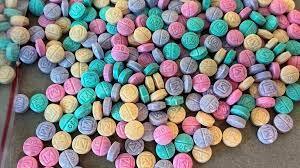Fentanyl is a powerful synthetic opioid that is similar to morphine but is 50-100 times more potent. Because of its high potency, even small amounts can cause serious harm. Fentanyl may be mixed with heroin and other drugs, often without the user's knowledge. This makes it extremely dangerous as users do not know the potency of the drug they are using and do not have the proper tools to protect themselves from overdosing.
There are many different forms of fentanyl that can be ingested, snorted, or injected. These include powder-form fentanyl (white in color), tablet form, and liquid form. The most common form of fentanyl is powder. It can be mixed with heroin or other drugs, or it may be pressed into pills that are made to look like other prescription opioids such as oxycodone, hydrocodone, and Xanax.
According to the CDC, synthetic opioids accounted for 71,238 preventable deaths in 2021, representing a large increase over the 57,834 total in 2020. And it’s not slowing down!

Fentanyl is highly addictive
Fentanyl is an opioid pain medication that is commonly prescribed by doctors to treat severe or chronic pain. It can be found in both oral and injectable forms, though the injectable form may only be available through prescription from a doctor. This powerful drug works by binding to opioid receptors in the brain and spinal cord to help reduce or eliminate pain signals that are sent to the central nervous system.
However, despite its effectiveness as a pain reliever, fentanyl is also highly addictive. This is because of the way that it activates opioid receptors in the brain and spinal cord to block pain signals. Over time, this can actually rewire the pathways between these parts of the body and lead to a physical dependence on the drug.
Signs and Symptoms of Fentanyl Addiction
If you are worried about someone you love who may be addicted to fentanyl, there are several noticeable signs and symptoms that may indicate a problem. These can include:
Personality Changes
Frequent and unexplained mood swings or personality changes: Someone with a fentanyl addiction may appear to be depressed, irritable and anxious most of the time. They may also have trouble sleeping, suffer from memory loss, or experience frequent nightmares.
Changes in Appearance
Changes in appearance may occur such as unexplained changes in weight (either losing weight or gaining a lot of weight). Other physical signs include dry skin and cracked lips.
Changes in behavior
Someone with a fentanyl addiction may become withdrawn, secretive, and obsessive about taking the drug. They may also lose interest in activities they once enjoyed or start stealing money to buy drugs.
Financial problems
Many people with a fentanyl addiction will spend all of their money on buying drugs rather than paying for basic necessities like food or rent.
Changes in relationships
Someone with a fentanyl addiction may start to neglect their closest relationships and isolate themselves from friends and family. They may also have strained relationships with their partner, children, or other family members.
Physical changes
Aside from the physical signs described earlier, someone with a fentanyl addiction may suffer from breathing problems such as respiratory depression as well as constipation or itchy skin.
Fentanyl Addiction Treatment Options
If you or someone you love is addicted to fentanyl, there are several effective treatment options available. These include:
Medication-assisted treatment (MAT): MAT refers to a combination of medication and behavioral therapy that is used to treat opioid addiction. It usually involves the use of drugs like methadone or buprenorphine that are used to manage withdrawal symptoms and suppress cravings. It also involves behavioral therapy to help someone overcome their addiction.
Inpatient rehab is ideal for people who are struggling with severe opioid addictions, as it provides 24-hour support and supervision by medical professionals. It also offers a range of different therapies designed to treat each individual person’s needs.
Outpatient rehab can help people who have mild or moderate opioid addictions. It involves attending daily or weekly therapy sessions to learn about addiction and how to overcome it.
If you’ve developed an addiction and are currently on your own trying to get clean, there are several options available to you. Many people choose addiction treatment centers since they offer 24-hour monitoring and support; others choose to try outpatient programs. If you’re thinking about trying one of these options, you should speak with your doctor first and then do some research on the different types of programs available in your area. No matter which route you take, remember that help is out there, and recovery is possible!
Soberman's Estate is a residential men's addiction treatment center that provides discreet, individualized, sophisticated recovery and wellness services for adult men that want to recover from substance use disorders, and or other behavioral issues such as trauma, anxiety, depression, stress, or other addictions.




